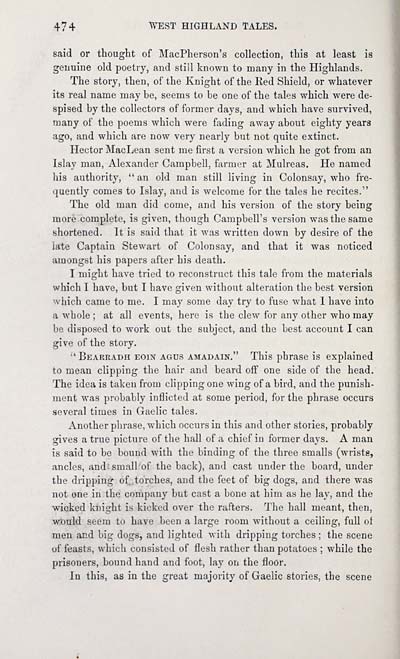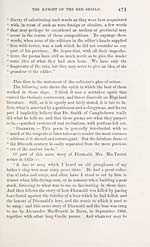Download files
Complete book:
Individual page:
Thumbnail gallery: Grid view | List view

474 WEST HIGHLAND TALES.
said or thought of MacPherson's collection, this at least is
geiiuine old poetry, and still known to many in the Highlands.
The story, then, of the Knight of the Red Shield, or whatever
its real name may be, seems to be one of the tales which were de-
spised by the collectors of former days, and which have survived,
many of the poems which were fading away about eighty years
ago, and which are now very nearly but not quite extinct.
Hector MacLean sent me first a version which he got from an
Islay man, Alexander Campbell, farmer at Mulreas. He named
his authority, " an old man still living in Colonsay, who fre-
quently comes to Islay, and is welcome for the tales he recites."
The old man did come, and his version of the story being
more complete, is given, though Campbell's version was the same
shortened. It is said that it was written down by desire of the
late Captain Stewart of Colonsay, and that it was noticed
amongst his papers after his death.
I might have tried to reconstruct this tale from the materials
which I have, but I have given without alteration the best version
which came to me. I may some day try to fuse what 1 have into
a whole ; at all events, here is the clew for any other who may
be disposed to work out the subject, and the best account I can
give of the story.
" Bearradh EOix AGUS AMADAiN." This phrase is explained
to mean clipping the hair and beard off one side of the head.
The idea is taken from clipping one wing of a bird, and the punish-
ment was probably inflicted at some period, for the phrase occurs
several times in Gaelic tales.
Another phrase, which occurs in this and other stories, probably
gives a true picture of the hall of a chief in former days. A man
is said to be bound with the binding of the three smalls (wrists,
ancles, and: small of the back), and cast under the board, under
the dripping of. torches, and the feet of big dogs, and there was
not one in the company but cast a bone at him as he lay, and the
wicked knight is kicked over the rafters. The hall meant, then,
Would seem to have been a large room without a ceiling, full of
men and big dogs, and lighted with dripping torches ; the scene
of feasts, which consisted of flesh rather than potatoes ; while the
prisoners, bound hand and foot, lay on the floor.
In this, as in the great majority of Gaelic stories, the scene
said or thought of MacPherson's collection, this at least is
geiiuine old poetry, and still known to many in the Highlands.
The story, then, of the Knight of the Red Shield, or whatever
its real name may be, seems to be one of the tales which were de-
spised by the collectors of former days, and which have survived,
many of the poems which were fading away about eighty years
ago, and which are now very nearly but not quite extinct.
Hector MacLean sent me first a version which he got from an
Islay man, Alexander Campbell, farmer at Mulreas. He named
his authority, " an old man still living in Colonsay, who fre-
quently comes to Islay, and is welcome for the tales he recites."
The old man did come, and his version of the story being
more complete, is given, though Campbell's version was the same
shortened. It is said that it was written down by desire of the
late Captain Stewart of Colonsay, and that it was noticed
amongst his papers after his death.
I might have tried to reconstruct this tale from the materials
which I have, but I have given without alteration the best version
which came to me. I may some day try to fuse what 1 have into
a whole ; at all events, here is the clew for any other who may
be disposed to work out the subject, and the best account I can
give of the story.
" Bearradh EOix AGUS AMADAiN." This phrase is explained
to mean clipping the hair and beard off one side of the head.
The idea is taken from clipping one wing of a bird, and the punish-
ment was probably inflicted at some period, for the phrase occurs
several times in Gaelic tales.
Another phrase, which occurs in this and other stories, probably
gives a true picture of the hall of a chief in former days. A man
is said to be bound with the binding of the three smalls (wrists,
ancles, and: small of the back), and cast under the board, under
the dripping of. torches, and the feet of big dogs, and there was
not one in the company but cast a bone at him as he lay, and the
wicked knight is kicked over the rafters. The hall meant, then,
Would seem to have been a large room without a ceiling, full of
men and big dogs, and lighted with dripping torches ; the scene
of feasts, which consisted of flesh rather than potatoes ; while the
prisoners, bound hand and foot, lay on the floor.
In this, as in the great majority of Gaelic stories, the scene
Set display mode to: Large image | Transcription
Images and transcriptions on this page, including medium image downloads, may be used under the Creative Commons Attribution 4.0 International Licence unless otherwise stated. ![]()
| Early Gaelic Book Collections > Blair Collection > Popular tales of the West Highlands > Volume 2 > (492) |
|---|
| Permanent URL | https://digital.nls.uk/81399377 |
|---|
| Description | Vol. II. |
|---|---|
| Shelfmark | Blair.174 |
| Attribution and copyright: |
|
| Description | Orally collected, with a translation by J.F. Campbell. |
|---|---|
| Shelfmark | Blair.173-176 |
| Additional NLS resources: | |
| Description | A selection of books from a collection of more than 500 titles, mostly on religious and literary topics. Also includes some material dealing with other Celtic languages and societies. Collection created towards the end of the 19th century by Lady Evelyn Stewart Murray. |
|---|
| Description | Selected items from five 'Special and Named Printed Collections'. Includes books in Gaelic and other Celtic languages, works about the Gaels, their languages, literature, culture and history. |
|---|

